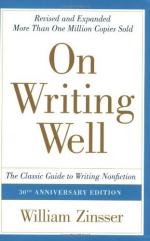
|
| Name: _________________________ | Period: ___________________ |
This test consists of 15 multiple choice questions and 5 short answer questions.
Multiple Choice Questions
1. What is an example of American television shows that use humor to talk about serious issues?
(a) The Evening News.
(b) The Today Show.
(c) The View.
(d) Saturday Night Live.
2. How does Zinsser create his final products?
(a) He pawns them off to his editor which sends his writing back with red squiggles.
(b) He takes a week to read over his writing with fresh eyes.
(c) He usually knows his writing is good, so he just gives everything a once over and he is done.
(d) He spends hours finding the right words, best rhythms, and makes sure every sentence leads into another.
3. Why should companies learn to produce better writing?
(a) In a capitalistic world, there is always competition and good writing reduces it.
(b) To produce more writing jobs.
(c) To appeal to educators.
(d) To get more clients to understand their terms.
4. Why is it so hard to write about places?
(a) Places change over time and it is hard to stay true to the general feel of a place.
(b) Writers tend to fall into cliches, especially when writing about well known places.
(c) It is hard to translate what the eyes see.
(d) Two people never see a place the same way.
5. How is humor used in writing nonfiction?
(a) It is never used. Nonfiction should always be serious.
(b) It is used to make fun of people without them every knowing.
(c) It is used to bring out points that cannot be made in a straight forward manner.
(d) It is used to practice jokes for stand up comedians.
6. What is a memoir?
(a) They can be about any life experience.
(b) They are stories about immigrants.
(c) They are books about other people written by ghostwriters.
(d) They are fiction peices about real people.
7. What are Zinsser's four articles of faith to writing well?
(a) Clarity, simplicity, brevity and humanity.
(b) Clarity, simplicity, elasticity and minimalism.
(c) Simplicity, brevity, busy sentences and proper grammer.
(d) Brevity, quick turnaround, clever sentences and little humanity.
8. What does Zinsser throw away in his writing classes?
(a) Deadlines.
(b) Story prompts.
(c) Story webs.
(d) Books.
9. What approach to a place should writers take?
(a) To go around asking the locals questions.
(b) Just writing ambiguously.
(c) To go within a place and see how it impacts the writer.
(d) Reading other travel pieces and compare them.
10. Cliche words should be avoided at all costs. What else should be avoided?
(a) Overly describing a single place.
(b) Not describing a place enough.
(c) Assuming the writer has already been to a place.
(d) Cliched details.
11. How does Zinsser end his travel article that he wrote about Timbuktu?
(a) He ends by telling the truth and stating how satisfied he was with his desert experience.
(b) He ends with a joke about how hot it was in the desert.
(c) He repeats his first sentence, throws in a stat about the country, and mentions eveyrone should visit at one point in their life.
(d) He generalizes the story.
12. What do people need to understand about science?
(a) It can be learned at any point in life.
(b) It is a foundation that needs to be built upon.
(c) It is easy to understand if given the chance.
(d) Only nerds can learn it.
13. What occurs when business writing is bad?
(a) People will get fired for bad writing.
(b) Investors will agree to terms they do not understand.
(c) Customers will go elsewhere to buy their goods and services.
(d) Executives get fired for pawning off simple writing tasks.
14. Why is it important for writers to practice?
(a) Writers dont need to practice, they just need to write.
(b) In order to make daily word counts.
(c) In order to stay ahead of other writers that are also looking for jobs.
(d) Writing is a craft, much like dancing and painting. All three need to do their thing.
15. What freedom does he give his students?
(a) He lets everyone out early on Fridays.
(b) The power to decide what to write about, what angle to take, what perspective, and what to cut out.
(c) He doesn't give deadlines, the gives very little guidance, and just lets people write and turn in first drafts.
(d) He doesn't give freedom. He is very demanding of his students.
Short Answer Questions
1. What does Zinsser think about this misconception?
2. His article was supposed to be about his impressions of salt caravans, why didn't he write more about this?
3. How does Zinsser gain an edge over his competition?
4. What do people forget about writing?
5. What is a general rule for writing about sports?
|
This section contains 912 words (approx. 4 pages at 300 words per page) |

|




